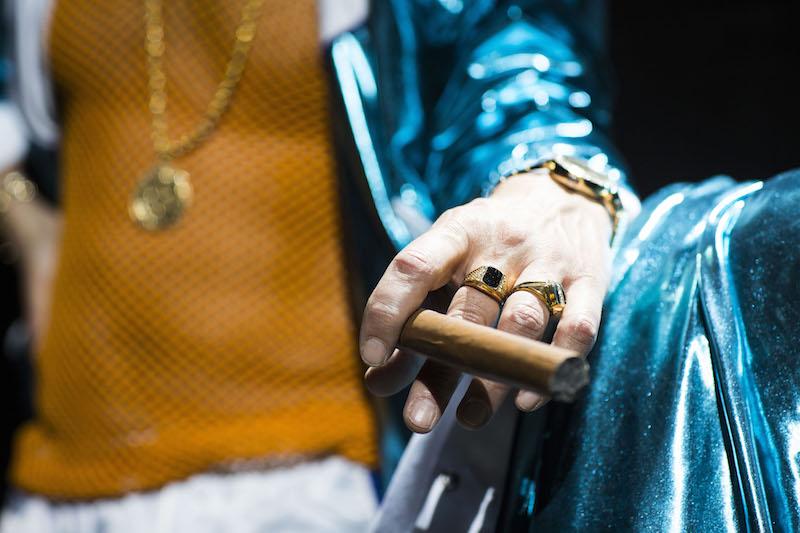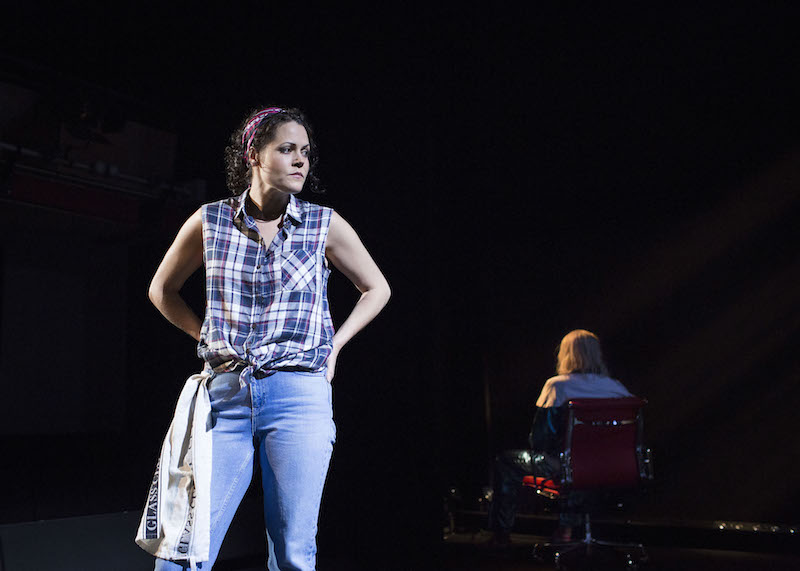An Audience with Jimmy Savile, Park Theatre | reviews, news & interviews
An Audience with Jimmy Savile, Park Theatre
An Audience with Jimmy Savile, Park Theatre
Controversial play offers responsible reconstruction, but minimal drama

Seldom has there been such impassioned debate about whether a play has a right to exist. Writer Jonathan Maitland faced a barrage of criticism, with many accusing him of exploitation; others felt it was too soon for freshly unveiled horror to re-emerge on stage. Lead actor Alistair McGowan disagreed, noting Savile’s victims feel the telling of this tale comes “30 years too late”.
Maitland’s 90-minute docudrama, set in 1991, juxtaposes Savile’s public and private personas in an attempt to understand how the monster hid in plain sight. On a This Is Your Life-style show, he’s the roguish “court jester” to an adulatory Prince Charles, knighted by both Thatcher and the Vatican, and unimpeachable national treasure converting staggering popularity into bountiful fundraising. And yet there’s Lucy (Leah Whitaker, pictured below), a composite of several victims, raped by Savile aged 12 while recovering in hospital. The authority figures she confided in – nurse, doctor, father, police – all failed her. Now, as her own daughter turns 12, she’s determined to get justice.
 Savile’s real victims were denied legal recourse, so Maitland hopes his play functions as “the trial he never had in his lifetime”. That prosecution extends to the culture that allowed him to act unchecked. Savile boasts membership of a “Friday morning club”, composed of high-ranking establishment figures. We witness a BBC keen to protect its “man of the people” asset, grateful hospital administrators offering unlimited access, police officers burying accusations, journalists intimidated into silence. Despairing Lucy quotes Measure for Measure’s similarly untouchable Angelo: “My false o’erweighs your true.”
Savile’s real victims were denied legal recourse, so Maitland hopes his play functions as “the trial he never had in his lifetime”. That prosecution extends to the culture that allowed him to act unchecked. Savile boasts membership of a “Friday morning club”, composed of high-ranking establishment figures. We witness a BBC keen to protect its “man of the people” asset, grateful hospital administrators offering unlimited access, police officers burying accusations, journalists intimidated into silence. Despairing Lucy quotes Measure for Measure’s similarly untouchable Angelo: “My false o’erweighs your true.”
As Savile, McGowan performs a skin-crawling conjuring trick. It’s not just the familiar styling – shiny tracksuit, string vest, scraggly blond wig, ever-present cigar – and total command of mannerisms and speech patterns, but a shrewd understanding of this bullying, litigious thug in the guise of a clown who harnessed “the power of odd”. We become sickeningly complicit as the skilled entertainer charms and disarms, until his underlying brutality and foul-mouthed misogyny are revealed, notably in a riveting verbatim police interview. Particularly repellent is his appropriation of Catholic doctrine, arguing his good deeds cancel out the bad: “In the bank of life, I am in the black.”
Yet both Maitland’s play and Brendan O’Hea’s diligent production prioritise respectful exposition over satisfying drama. Lucy remains an underdeveloped symbol of suffering, and her wish fulfilment climax rings false. Committed Whitaker does offer a devastating moment as Lucy relates her experience of paedophilic rape: too young to understand what was happening, and that she should be scared.
Graham Seed is credible as the manipulated TV presenter, and Charlotte Page and Robert Perkins ably cover several parts, including Savile’s convicted partner-in-crime Ray Teret. The question remains whether this is the right time for such a play, and if this is the right one, but refashioning the legacy of a man who took such pleasure in controlling his own narrative does offer a certain theatrical justice.
rating
Explore topics
Share this article
The future of Arts Journalism
You can stop theartsdesk.com closing!
We urgently need financing to survive. Our fundraising drive has thus far raised £49,000 but we need to reach £100,000 or we will be forced to close. Please contribute here: https://gofund.me/c3f6033d
And if you can forward this information to anyone who might assist, we’d be grateful.

Subscribe to theartsdesk.com
Thank you for continuing to read our work on theartsdesk.com. For unlimited access to every article in its entirety, including our archive of more than 15,000 pieces, we're asking for £5 per month or £40 per year. We feel it's a very good deal, and hope you do too.
To take a subscription now simply click here.
And if you're looking for that extra gift for a friend or family member, why not treat them to a theartsdesk.com gift subscription?
more Theatre
 The Weir, Harold Pinter Theatre review - evasive fantasy, bleak truth and possible community
Three outstanding performances in Conor McPherson’s atmospheric five-hander
The Weir, Harold Pinter Theatre review - evasive fantasy, bleak truth and possible community
Three outstanding performances in Conor McPherson’s atmospheric five-hander
 Dracula, Lyric Hammersmith review - hit-and-miss recasting of the familiar story as feminist diatribe
Morgan Lloyd Malcolm's version puts Mina Harkness centre-stage
Dracula, Lyric Hammersmith review - hit-and-miss recasting of the familiar story as feminist diatribe
Morgan Lloyd Malcolm's version puts Mina Harkness centre-stage
 The Code, Southwark Playhouse Elephant review - superbly cast, resonant play about the price of fame in Hollywood
Tracie Bennett is outstanding as a ribald, riotous Tallulah Bankhead
The Code, Southwark Playhouse Elephant review - superbly cast, resonant play about the price of fame in Hollywood
Tracie Bennett is outstanding as a ribald, riotous Tallulah Bankhead
 Reunion, Kiln Theatre review - a stormy night in every sense
Beautifully acted, but desperately grim drama
Reunion, Kiln Theatre review - a stormy night in every sense
Beautifully acted, but desperately grim drama
 The Lady from the Sea, Bridge Theatre review - flashes of brilliance
Simon Stone refashions Ibsen in his own high-octane image
The Lady from the Sea, Bridge Theatre review - flashes of brilliance
Simon Stone refashions Ibsen in his own high-octane image
 Romans: A Novel, Almeida Theatre review - a uniquely extraordinary work
Alice Birch’s wildly epic family drama is both mind-blowing and exasperating
Romans: A Novel, Almeida Theatre review - a uniquely extraordinary work
Alice Birch’s wildly epic family drama is both mind-blowing and exasperating
 The Producers, Garrick Theatre review - Ve haf vays of making you laugh
You probably know what's coming, but it's such great fun!
The Producers, Garrick Theatre review - Ve haf vays of making you laugh
You probably know what's coming, but it's such great fun!
 Not Your Superwoman, Bush Theatre review - powerful tribute to the plight and perseverance of Black women
Golda Rosheuvel and Letitia Wright excel in a super new play
Not Your Superwoman, Bush Theatre review - powerful tribute to the plight and perseverance of Black women
Golda Rosheuvel and Letitia Wright excel in a super new play
 Cow | Deer, Royal Court review - paradox-rich account of non-human life
Experimental work about nature led by Katie Mitchell is both extraordinary and banal
Cow | Deer, Royal Court review - paradox-rich account of non-human life
Experimental work about nature led by Katie Mitchell is both extraordinary and banal
 Deaf Republic, Royal Court review - beautiful images, shame about the words
Staging of Ukrainian-American Ilya Kaminsky’s anti-war poems is too meta-theatrical
Deaf Republic, Royal Court review - beautiful images, shame about the words
Staging of Ukrainian-American Ilya Kaminsky’s anti-war poems is too meta-theatrical
 Laura Benanti: Nobody Cares, Underbelly Boulevard Soho review - Tony winner makes charming, cheeky London debut
Broadway's acclaimed Cinderella, Louise, and Amalia reaches Soho for a welcome one-night stand
Laura Benanti: Nobody Cares, Underbelly Boulevard Soho review - Tony winner makes charming, cheeky London debut
Broadway's acclaimed Cinderella, Louise, and Amalia reaches Soho for a welcome one-night stand
 The Pitchfork Disney, King's Head Theatre review - blazing with dark energy
Thrilling revival of Philip Ridley’s cult classic confirms its legendary status
The Pitchfork Disney, King's Head Theatre review - blazing with dark energy
Thrilling revival of Philip Ridley’s cult classic confirms its legendary status

Add comment